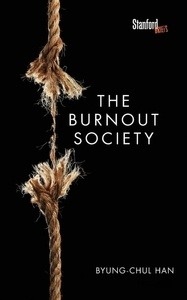The Burnout Society

Editorial Stanford
Fecha de edición agosto 2015 · Edición nº 1
Idioma inglés
EAN 9780804795098
68 páginas
Libro
encuadernado en tapa blanda
Resumen del libro
Our competitive, service-oriented societies are taking a toll on the late-modern individual. Rather than improving life, multitasking, "user-friendly" technology, and the culture of convenience are producing disorders that range from depression to attention deficit disorder to borderline personality disorder. Byung-Chul Han interprets the spreading malaise as an inability to manage negative experiences in an age characterized by excessive positivity and the universal availability of people and goods.
Stress and exhaustion are not just personal experiences, but social and historical phenomena as well. Denouncing a world in which every against-the-grain response can lead to further disempowerment, he draws on literature, philosophy, and the social and natural sciences to explore the stakes of sacrificing intermittent intellectual reflection for constant neural connection.
Biografía del autor
Byung-Chul Han (Seúl, Corea del Sur, 1959) es un filósofo y ensayista experto en estudios culturales. Se le considera uno de los filósofos más destacados del pensamiento contemporáneo por su crítica al capitalismo y la sociedad del trabajo. <br> Han estudió Filología Alemana y Teología en la Universidad de Múnich y Filosofía en la Universidad de Friburgo, donde se doctoró con una tesis sobre Martin Heidegger. Ha dado clases de Filosofía en la Universidad de Basilea, de Filosofía y Teoría de los medios en la Escuela Superior de Diseño de Karlsruhe y de Filosofía y Estudios culturales en la Universidad de las Artes de Berlín.<br> Es autor de más de una veintena de títulos entre los que cabe destacar: La sociedad del cansancio, La sociedad de la transparencia, Psicopolítica, No-cosas, Infocracia y Vida contemplativa. Todos ellos han sido traducidos a varios idiomas.<br> El trabajo de Han une tradiciones filosóficas orientales y occidentales, tomando ideas de pensadores como Friedrich Nietzsche, Martin Heidegger, Michel Foucault, Sigmund Freud, Hannah Arendt y Walter Benjamin, entre otros. Explora temas como la tecnología y los efectos del neoliberalismo en los diversos aspectos de la vida humana, el poder, la comunicación, la vigilancia, el consumismo, el trabajo, la autoexplotación, la transparencia, los rituales, la inactividad y las identidades individuales y colectivas; y es considerado como el sucesor de pensadores como Roland Barthes o Giorgio Agamben.








